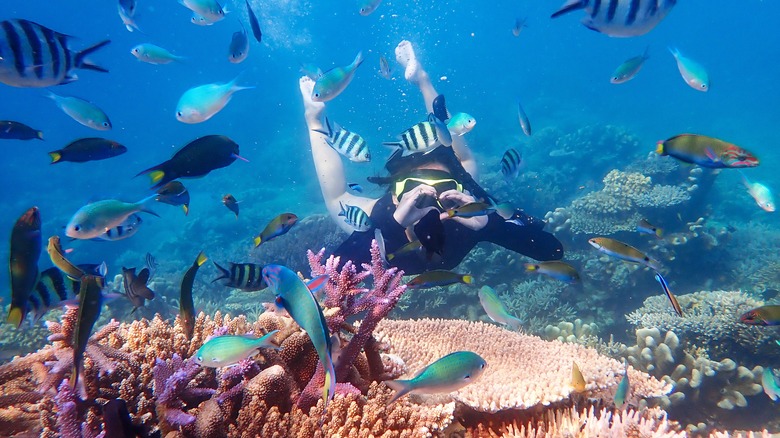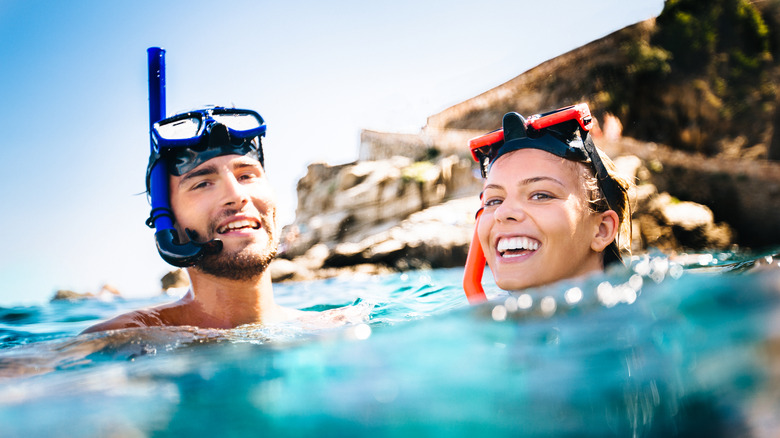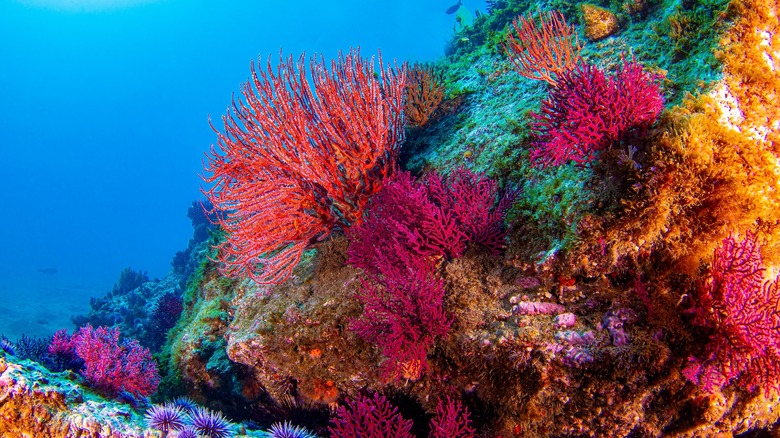How To Protect Coral And Other Wildlife When Snorkeling
If you've ever spent time snorkeling or scuba diving in a healthy coral reef, you've likely been enchanted by the magic of the abundant marine life thriving just beneath the surface of the sea. Shimmering fish of every color dart in and out of vibrant colonies of polyps — tiny living creatures that join together to form the beautiful underwater structures we know as coral. Many beloved marine species rely on reefs to survive including sea turtles, starfish, sea horses, and octopuses.
Sadly, these tender and awe-inspiring ecosystems are dying, and it's happening extremely quickly. Globally, about half of the coral reefs have died since 1950 and scientists believe that they may continue to decline up to 90%. Pollution, unsustainable fishing practices, harvesting coral for jewelry, and global climate change are all factors contributing to the decline of these fragile ecosystems.
While human beings are certainly a major factor in the decline of coral reefs, it doesn't mean you shouldn't experience their beauty. Falling in love with nature is the best way to get inspired and passionate about protecting earth's biodiversity — and it's difficult not to fall immediately and irrevocably in love with the beauty of coral reefs the moment you don your mask and dip below the ocean's surface for the first time. As long as you take a few protective precautions, you can feel good about booking your snorkeling adventure and enjoy diving in the reefs without causing further harm.
When it comes to coral reefs, look but don't touch
Simply touching a piece of coral can damage it. They're very sensitive, and contact can remove the mucus that coats them. They're also very susceptible to diseases, which you could unknowingly transmit on your hands. Furthermore, many species of coral could harm you, such as the species that emit a sting when touched. Other species found in coral reefs, like sea urchins, are armed with venom-filled spines that can puncture the skin quite easily. Some species may even have venomous bites. For the safety of yourself and the sea creatures, keep your hands to yourself when you're diving.
Taking care not to disturb the sand and sediment on the ocean floor during your dive is also crucial. Although this sometimes happens by mistake when your fin grazes the sea floor, lots of sediment rising up can harm coral and other marine species, especially filter feeders.
Feeding wild animals always causes more harm than good because their bodies aren't designed to process human food. If fed often they may eventually become dependent on human food to survive. Avoid feeding marine life, even if your snorkeling tour guide or dive instructor suggests it. To snorkel safely, simply swim just above the reef without making physical contact. You can linger for hours in some of the world's best snorkeling spots, take pictures and videos to your heart's content, and follow your favorite fish around for a while, but otherwise leave them be.
Choose a reef friendly products
Ensuring that you wear reef-friendly products on your body during your dive is crucial. The harsh chemicals found in many commercial sunscreens and other skincare products have been found to harm coral reefs. Even waterproof sunscreen comes off of your skin while swimming in the ocean, releasing toxic chemicals into the environment. According to the National Ocean Service, certain chemical ingredients like oxybenzone, octinoxate, and avobenzone can build up on the tissue of coral, causing problems like bleaching, DNA damages, deformities in young coral, and even death. They can also keep algae from growing, and build up in the system of mussels, sea urchins, fish, and dolphins causing reproductive issues or deformities. Experts believe that 14,000 tons of sunscreen end up in the ocean each year.
It's important to protect yourself from the sun's intense UV rays, which can cause skin cancer and premature signs of aging, so choose products without chemicals whenever you enter a natural body of water. Don't just look for things labeled "reef-friendly" because it's an unregulated term. Basically, any company could slap that on their label. Instead, check the ingredients. You want to choose a mineral-based sunscreen that uses physical UVA and UVB filters to protect you from the sun. You'll also want to avoid ingredients like micro-plastics. In addition to reef-friendly sunscreen, you can opt for protective UPF clothing like shirts, leggings, sunglasses, and hats.


